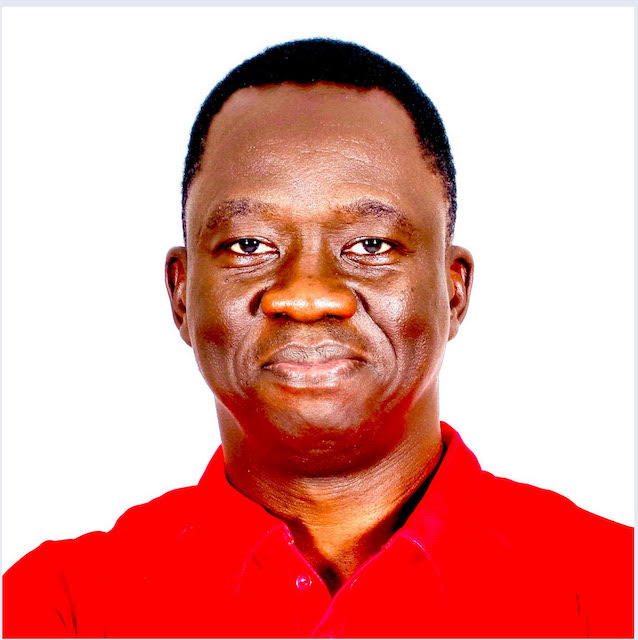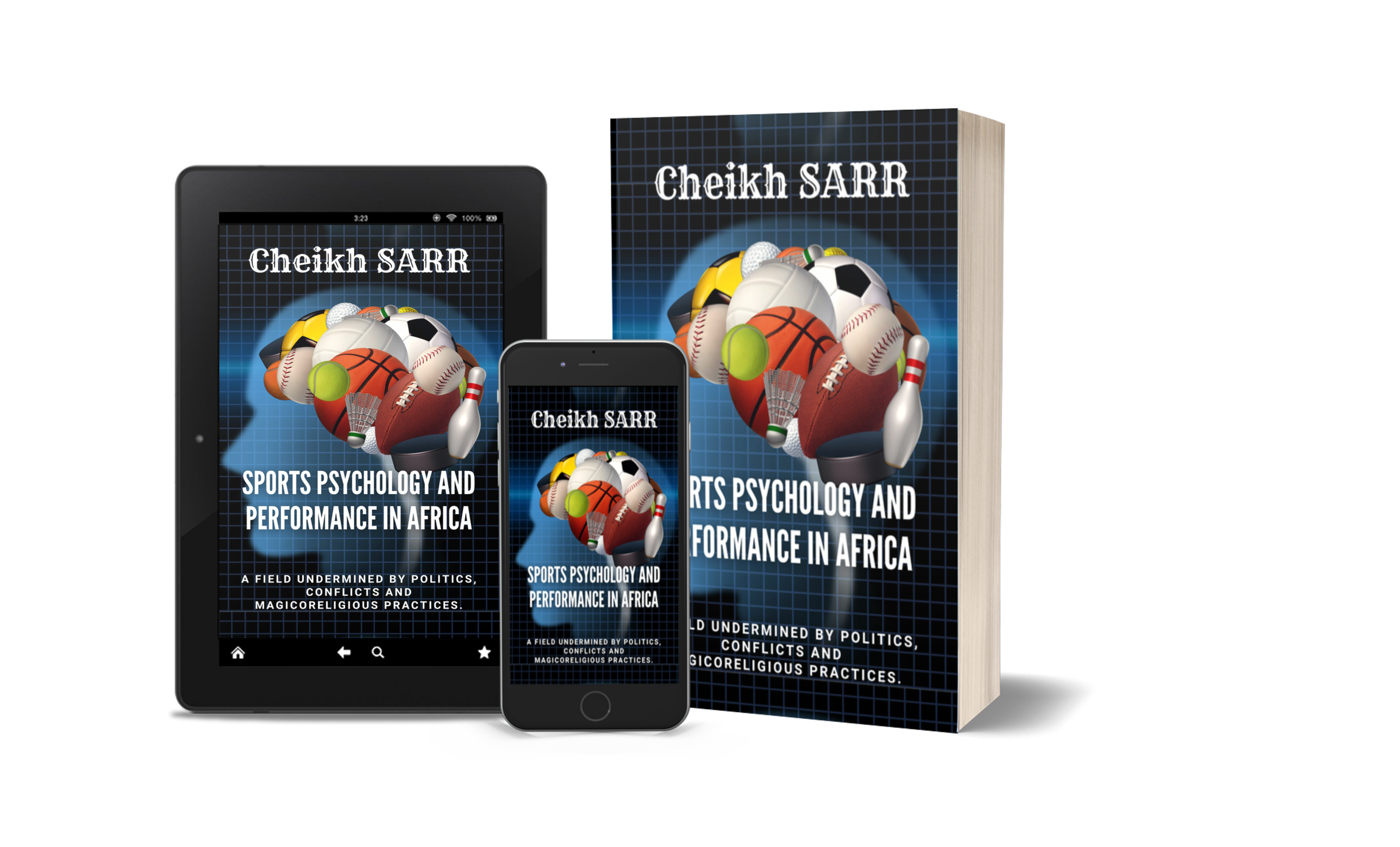**FOR IMMEDIATE RELEASE**
Introduction

A Step Towards the Unusual: Dr Cheikh Sarr (PhD) Ventures into Uncharted Territory with Debut Book
In a bold and groundbreaking move, Dr. Cheikh Sarr (PhD) has taken a daring step into the realm of the unusual with the release of his inaugural book. Titled "Sports Psychology and Performance in Africa," this literary venture introduces a new scientific discipline to the African sporting landscape, which is already permeated by magicoreligious practices.
The infusion of sports psychology into the fabric of African sports poses a challenging endeavour, as these magicoreligious practices are often perceived as having a tangible impact on performance by a significant number of athletes. The coexistence of these traditional beliefs and modern sports raises intriguing questions about the influence of personal convictions on athletic achievement.
While some sports organizations may view the integration of sports psychology with scepticism, considering it a departure from their professional values that champion fair play and neutrality regarding personal convictions, it also opens an optimistic window. Dr. Cheikh Sarr's pioneering work seeks to navigate this intricate landscape, shedding light on the intersections of sports, psychology, and cultural beliefs. In doing so, he aims to spark a dialogue that transcends boundaries, fostering a deeper understanding of the diverse factors influencing athletic performance.
As the sporting world braces for a new perspective, Dr Cheikh Sarr's book challenges conventions, providing a fresh lens through which to explore the complex relationship between sports, psychology, and the unique cultural tapestry of Africa. This is a journey into uncharted territory, where the convergence of tradition and modernity invites reflection and offers an optimistic glimpse into the future of sports on the continent.
For media inquiries, review copies or interviews, please directly contact:
Publisher Contact: info.dadymindsltd@gmail.com
### Book Details:
- Title: Sports Psychology and Performance in Africa
- Author: Dr. Cheikh Sarr (PhD)
- Subtitle: A Field Undermined by Politics, Conflicts, and Magicoreligious Practices
- Release Date: January 15, 2024
### ### ### ### ###
Click Here to Look Inside the Book
About The Author

Cheikh SARR: From Senegal's Courts to Global Recognition
Born in the vibrant town of Joal Fadiouth, Senegal, Cheikh SARR's journey is an odyssey that seamlessly blends a passion for basketball, a commitment to education, and a relentless pursuit of excellence.
A product of Thiès, Cheikh embarked on his academic voyage after earning his BAC diploma from Malick Sy High School. His academic pursuits led him to the prestigious University Cheikh Anta Diop of Dakar (UCAD), where he honed his skills at the National High Institute of Sport and Physical Education (INSEPS). With a Physical Education Teaching Certificate (CAPEPS) in hand, his thirst for knowledge took him to Germany in 2003 to delve into Sports Psychology. Later, the United States beckoned, and at the University of Delaware, he earned his Master of Education and Sports Management degree in 2008.
Returning to Senegal, Cheikh dedicated his expertise to SEEDS Academy from 2008 to 2011, making significant contributions to the intersection of sports and education. His passion for research led him back to academia as a teacher-researcher at Gaston Berger University (UGB) of St Louis in 2012, where he achieved the pinnacle of his academic journey with a Doctorate in Sports Psychology in 2016.
From 2017 to 2021, as the Chief of the Sports Sciences and Physical Activities Department (STAPS) at the School of Education and Sport Faculty (SEFS) of St Louis, Cheikh shared his wealth of knowledge, teaching sports psychology and basketball to undergraduates and graduate students. His role also included managing the division of student-athletes in elite sports, showcasing his ability to seamlessly balance academics and basketball.
Cheikh's impact extends far beyond the classroom. As a national team coach of Senegal, he earned a reputation for rigour and hard work, achieving historic milestones during the men's (2014) and women's (2018) World Cups. Internationally, he played a pivotal role in elevating Rwanda's basketball profile, with the women securing the 4th place at Afrobasket 2023 and the men's team clinched the 3rd place at AFROCAN.
Today, Cheikh SARR holds the esteemed status of Instructor of Instructors at FIBA World Coaches Basketball Association (WABC), symbolizing his unparalleled dedication to the sport. His influence resonates globally, evident in the multitude of training courses, clinics, and camps conducted in various African cities, from Abidjan to Kigali, showcasing his commitment to shaping the future of basketball on the continent.
Click Here to Look Inside the Book
About The Book
"Sports Psychology and Performance in Africa": Navigating the Uncharted Territories of Mind and Magic
Does the ability of a marabout determine your victory or defeat? This thought-provoking question opens the gateway to a critical exploration within the pages of "Sports Psychology and Performance in Africa." Dr. Cheikh SARR (PhD) embarks on a challenging journey, introducing sports psychology—a scientific discipline—into the already mystical realm of African sports.
In a landscape where athletes attribute tangible impacts on performance to mystical practices, the integration of sports psychology becomes a formidable obstacle. Some sports organizations view these practices negatively, conflicting with the values of fair play and neutrality towards players' personal beliefs. However, within these challenges, an optimistic perspective emerges.
Designed primarily for sports science students, this book goes beyond conventional classroom use. It serves as a foundational resource for online learning, incorporating multimedia content and interactive exercises to enrich the educational experience. Dr SARR's multidimensional exploration extends to the hidden aspects of the sport, unveiling connections with violence, media, racism, doping, studies, and religion.
This critical analysis of sports psychology within the broader African context reveals hurdles such as limited acceptance by athletes and sports organizations. The book scrutinizes the prioritization of psychosociological and magico-religious practices over sports psychology, which faces obstacles due to a lack of awareness, education, and limited resources.
African athletes, often prioritizing physical over mental aspects of training, remain unaware of the potential benefits of sports psychology. Financial and human resource constraints further impede its development. Despite these challenges, sports organizations in Africa view mystical practices as effective, reflecting a connection between athletes and their cultural roots.
The book's second aim is to unveil contradictions and hidden interests in societal and organizational discourses on sport. It explores the dual nature of sport, where some emphasize its values, while others see it as a reflection of a society influenced by politics, religion, racism, media, and violence.
In essence, "Sports Psychology and Performance in Africa" is a profound exploration of navigating the intricate relationship between sports psychology and mystical practices. It addresses challenges, provides educational resources, and critically analyzes the broader societal and organizational dynamics of sport. Dr. Cheikh SARR's work invites readers to unravel the complexities of mind and magic in the African sporting context.
Click Here to Look Inside the Book
What is Inside: Table of Content
Contents
Foreword vii
Acknowledgement x
Dedication xii
1. General Introduction 1
1.1. Why Sports Psychology and Performance in Africa 1
1.2. The need for intervention 5
2. Sports 8
2.1. Definition Of Sport 9
2.2. Update on Sport and Physical Activity 11
2.3. The hidden face of modern sport 16
2.4. Sport, a reflection of society 20
2.5. Violence associated with sporting events 21
2.6. Sports and Media 27
2.7. Sport and Politics 33
2.8. Sport and Racism 43
2.9. Sports and Corruption 45
2.10. Sports Performance 48
2.10.1. The determining factors of performance 48
2.10.1.1. Physical training 48
2.10.1.2. Technical training 49
2.10.2. Role of technique and tactics in some sports 49
2.10.3. Role of psychological factors 50
2.10.3.1. Self-confidence 50
2.10.3.2. Anxiety 51
2.10.3.3. The stress 52
2.11. Analysis of psychological constraints linked to sport 52
3. Sports Psychology 55
3.1. Genesis of Sports Psychology 56
3.1.1. A structured discipline 61
3.1.2. An autonomous and scientific discipline 65
3.1.3. A professional discipline. 67
3.2. Functions of the Sports Psychologist 68
3.3. State of research on psychological factors and performance. 69
4. The Anglo-Saxon Perspective 74
4.1. Goal Setting 76
4.1.1. Characteristics of Effective Goals 78
4.1.2. Objectives based on process, performance and result 78
4.1.3. Choosing an effective goal 80
4.2. Emotional Control 82
4.2.1. Characteristics of good condition 84
4.2.2. Some results of scientific analyses 85
4.3. The State of Stress 87
4.3.1. The origins of stress 87
4.3.2. Manifestations you Stress 89
4.3.3. Some treatment 90
4.4. Automaticity (the flow) 91
4.4.1. Flow dimensions 95
4.4.2. The brain in a state of Flow 97
4.4.3. Flow assessment 97
4.5. Positive Thoughts 99
4.5.1. Role of positive thoughts 99
4.5.2. Methods to remove negative thoughts 101
4.6. Mental Imagery 102
4.6.1. Explanatory hypotheses 103
4.6.2. Factors that influence the effectiveness of imaging 105
4.6.2.1. Imagery skill 105
4.6.2.2. The technical level of the athlete 105
4.6.3. Programming and action planning. 105
4.6.3.1. Characteristics of mental imagery 106
4.6.3.2. Efficiency condition 106
4.6.4. Practical applications 106
4.7. La Relaxation 107
4.7.1. Principles 107
4.7.2. Psycho-muscular training 108
4.7.3. Acoustic influence 110
4.7.4. Jacobson muscle relaxation 110
4.7.5. Relationship between pressure and performance 111
4.7.6. Your stress management techniques 113
4.7.6.1. Activation techniques 113
4.7.6.2. Inhibition techniques 113
4.8. Internal Dialogue 115
4.8.1. How does internal dialogue work? 118
4.8.2. Criticism 122
4.8.3. Altered thinking 123
4.8.4. Irrational beliefs 124
4.8.5. Optimization of internal dialogue 127
4.8.5.1. Become aware of your tendencies regarding
internal dialogue 128
4.8.6. Positive thoughts program 129
4.9. Attentional Control 131
4.9.1. Features 132
4.9.2. Duration and intensity of concentration 132
4.9.3. Role of attention 133
4.9.4. Implications in sport 134
4.9.4.1. What does it mean to pay attention? 137
4.9.4.2. Does attention affect success in sports? 139
4.9.4.3. How to develop concentration 140
4.10. Activation 143
4.10.1. The benefits of activation 144
4.10.2. Activation strategies 145
4.10.3. Forms of activation 145
4.10.3.1. Auto activation : 145
4.10.3.2. Activation by others : 146
5. The African Perspective 147
5.1. While “mystical professionals” provide psychological support. 148
5.1.1. Who are they really, and what is their level of
involvement in sport? 150
5.2. Analysis of legitimation by the actors 155
5.2.1. The Role of Preparation 162
5.2.2. The Role of Prevention 165
5.2.3. The Role of Repair 166
5.2.3.1. Content conflicts: 168
5.2.3.2. Procedural conflicts: 168
5.2.3.3. Personal conflicts: 168
5.3. On the need for the adoption of sports psychology in Africa 173
6. Create proximity using the attribution theory approach 175
6.1. How can wrestlers communicate better? 175
6.2. Survey population 178
6.3. The assessment tool 179
6.4. Extraction of attributions 180
6.5. Coding 181
6.6. Results 183
6.7. Analyse 185
6.8. Discussion 188
6.9. Conclusion 189
7. General Conclusion 191
Glossary 194
Bibliographic References 197
Annexe 205
About the Author 208
Click Here to Look Inside the Book
Book Preview
Foreword
Continuing to believe and accept the speeches of politicians and those responsible for sports organizations during sporting events seems legitimate for those who would adopt a passive attitude and submit to the accepted ideas of the sporting cause. The intellectual who would answer to this name would adopt a different and singular position to distance himself from the danger of smug conservatism and received ideas.
This non-conformism does not seem to find any space for expression that allows for a point of view contrary to the glorification of the sporting ecosystem based on capitalism. To distance themselves from this orthodox approach would mean for certain intellectuals to swim against the tide of those “whose immediate function should be to provide critical work”, and who “have found in sport a convenient means of believing themselves to still be on the side of the people, that is to say, of the image they have of them font” (BROHM, 2019).
This book, without entering into an opposition between the subjective and the objective attempts to make a critical analysis of the psychology of sport and sport in a broad, but African, context, based on a radical structuralist approach. Like the radical structuralists who “believe that in the final analysis, material and social practices limit individuals, organizations and societies. Their approach
is rather realistic, positivist, deterministic and nomothetic.”(GURD, 1980), we also seek for our part, as much as possible, to explain the events but also to free the reader from the constraints of habit.
Beyond the desire to share the subject of a discipline little known in Africa, two stated wishes will serve as a common thread in this project. The first is to analyze the legitimization of psychosociological and magicoreligious practices in modern sports to the detriment of sports psychology. The latter is a relatively new discipline in Africa, and its development has been hampered by several major obstacles including limited acceptance by athletes themselves as well as sports organizations. Indeed, some African athletes still
consider the practice of physical activity to be primarily focused on the body rather than the mind. They do not always see the interest or relevance of using mental techniques to improve their physical performance. This attitude may be due to a lack of awareness and education about the potential benefits of sports psychology in their training. In addition, there is often a lack of financial and human resources dedicated to the development of this discipline in Africa. Sports organizations tend to underestimate its importance and therefore do not allocate sufficient investments for its promotion among professional or amateur athletes. On the contrary, the majority of African national federations and clubs allocate resources to magicoreligious practices for performance.
However, the world of African sports attaches great importance to these practices. They are considered effective means of influencing the sporting performance of an individual or a team. The beliefs and rituals linked to these practices may vary between cultures, but their impact on performance is often perceived as real by many athletes. Magico-religious practices can take different forms, ranging from prayers to animal sacrifices through the use of talismans or amulets. These acts often symbolize a connection between the athlete and their ancestors, their community or their God. “In our traditional African societies where there is a strong religious and cultural influence, we believe a lot in supernatural forces which act on our daily lives” according to (Diatta, 1999). Thus, among certain African athletes, the use of these rites can be motivated not only by a desire for personal success but also because they think that it will strengthen their cultural identity.
However, some sports organizations view this practice in a negative light because it goes against their professional values which advocate fair play as well as neutrality concerning the personal convictions of players. The second wants to demonstrate the contradictions and hidden interests behind societal and organizational discourses on sport. Indeed, sports would have a side hidden since while some magnify the values it carry, others think that it is only the reflection of a society influenced by politics, religion, racism, the media, and violence, among others.
Ibou SANE
Full Professor of Psycho-sociology
UFR of Letter and Human Sciences
Gaston BERGER University of Saint Louis
Senegal
Click Here to Look Inside the Book
*Follow the conversation: #SportsPsychAfrica #DrCheikhSarr #NewBookRelease #SportPsychAfrica #DrCheikhSARR #AfricanSports #MindAndMagic #NewBook #BookRelease #SportsPsychology #AfricanCulture #ExploreWithDrSARR






Social Connect